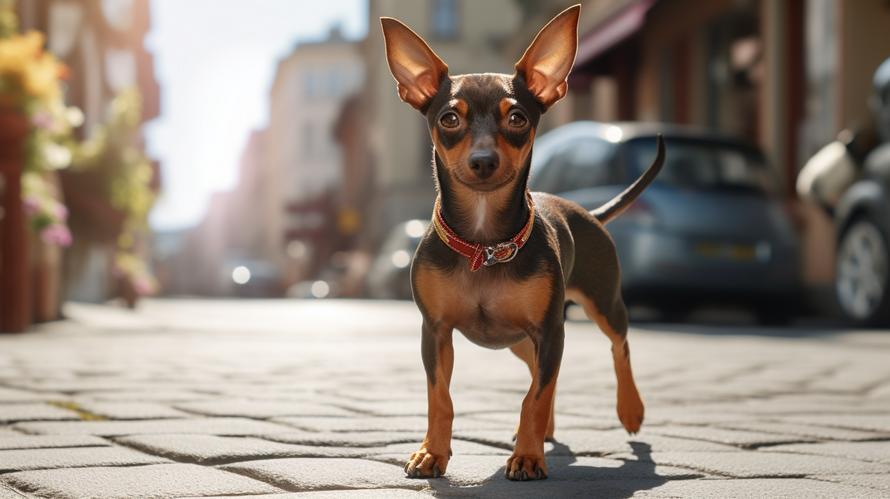With their pricked ears, shiny coats, and confident struts, Miniature Pinschers or “Min Pins” as they are lovingly called, sure have a regal aura around them. It’s no surprise that they’re often mistaken for tiny Doberman Pinschers, leading to the oft-repeated myth that Min Pins are “Miniature Dobermans”. In reality, these petite powerhouses are a distinct breed with origins that reportedly trace back several centuries before the first Doberman ever strutted onto the canine stage!
Often described as “the king of toys”, a title they earned not just for their size but their larger-than-life personality, the Min Pin breed can make a fascinating addition to any family. However, if you find yourself attracted to the Min Pin’s spunky sparkle, you may also find yourself asking, “Is a Miniature Pinscher a difficult dog?”
Before you bound headfirst into the Min Pin world, let’s peruse the terrain together, looking at what makes this breed tick.
First off, let’s talk personality! Min Pins are renowned for their big-dog-attitude in a small-dog-body. Animated, spirited, and brimming with moxie, these little guys are fearless, extremely energetic and often rather willful. For some, this exuberant and often mischievous demeanor might seem overwhelming, thus earning them a reputation of being ‘difficult’.
However, understanding the breed’s traits and tendencies goes a long way in successful Min Pin guardianship. Min Pins are naturally curious and love exploring their surroundings. They’re always on the prowl for an exciting adventure! Be it chasing a squirrel in the park or sniffing out the treat jar in your kitchen, they are ever ready for a challenge.
This competitive, questing spirit can cause trouble if it’s not channeled into constructive outlets. Regular exercise (both physical and mental) and a variety of stimulating toys can go a long way in keeping your Min Pin engaged and out of trouble.
Coming to another aspect that some may find challenging – training a Min Pin. There’s no skating around the fact that this breed can be stubborn, which can make training particularly tricky. However, it’s not so much that Min Pins are hard to train, as it is that they require a different kind of training.
Traditional, command-based training doesn’t get much traction with these independent thinkers. Instead, positive reinforcement methods that make learning fun and game-like work far better. Consistency, patience, and a sense of humor are all key ingredients when training a Min Pin. Trust us: those victories, once won, are sweet indeed!
Socialization is another crucial area during the early puppy days. Start this process early to ensure your Miniature Pinscher grows into a well-rounded canine citizen. Introduce them to various people, pets, noises, and environments to help them understand the world around them — just remember to keep a firm grip on that leash! Our curious and fast Min Pins can quickly get into a spot they can’t extract themselves from!
Speaking of leashes, it’s also important to note that Miniature Pinschers, like many small dogs, struggle with the idea of being ‘rained on’. They’re not a fan of wet weather, so ensuring you have a suitable indoor toileting solution or a covered outdoor area becomes necessary for certain climates.
Health-wise, Miniature Pinschers are generally robust little dogs with relatively few breed-specific health issues. However, like all breeds, they’re prone to certain conditions like hip dysplasia, luxating patella (a knee condition), and hypothyroidism. They can also become overweight rather easily, especially if they are not given enough exercise or are overfed.
When it comes to their care and maintenance, Min Pins have a pretty simple grooming routine. A quick, weekly brush to remove loose hair and distribute skin oils paired with regular dental and nail care is enough to keep these low-shedders looking their best.
Still, wondering if a Miniature Pinscher is a difficult dog? Well, like with any breed, it largely depends on your perspective, lifestyle, and expectations. Miniature Pinschers are certainly not for everyone; they require a caregiver who appreciates their vivacious spirit and is willing to invest time in consistent training and enriched, varied activities.
In return, their loyalty, love, and entertaining antics make every moment shared with a Min Pin a thrilling experience. With their feisty nature, playful antics, and spirited sense of curiosity, Min Pins infuse every day with a little extra zest – and that’s hard to resist!
Remember, challenging doesn’t mean impossible or undesirable. The unique attributes that afford Miniature Pinschers the tag of being ‘difficult’ are the very traits that make them stand out. They’re dynamic, intelligent, and stubbornly loyal – all packed into a sprightly, compact canine frame.
It’s about understanding their high energy, desire for fun-filled challenges, and a natural inclination towards independence. Once you approach their upbringing with empathy, a level of understanding, consistent positive reinforcement, and allow for enough socializing experiences, Miniature Pinscher ownership can be a rich, gratifying journey filled with countless memorable moments. Challenges ought to be seen not as hurdles but opportunities for growth both for yourself and your Min Pin.
After all, who could resist those alert, sparkling eyes and that jaunty, confident strut that screams, “I may be the size of your arm, but I’m every bit the king here!”?



